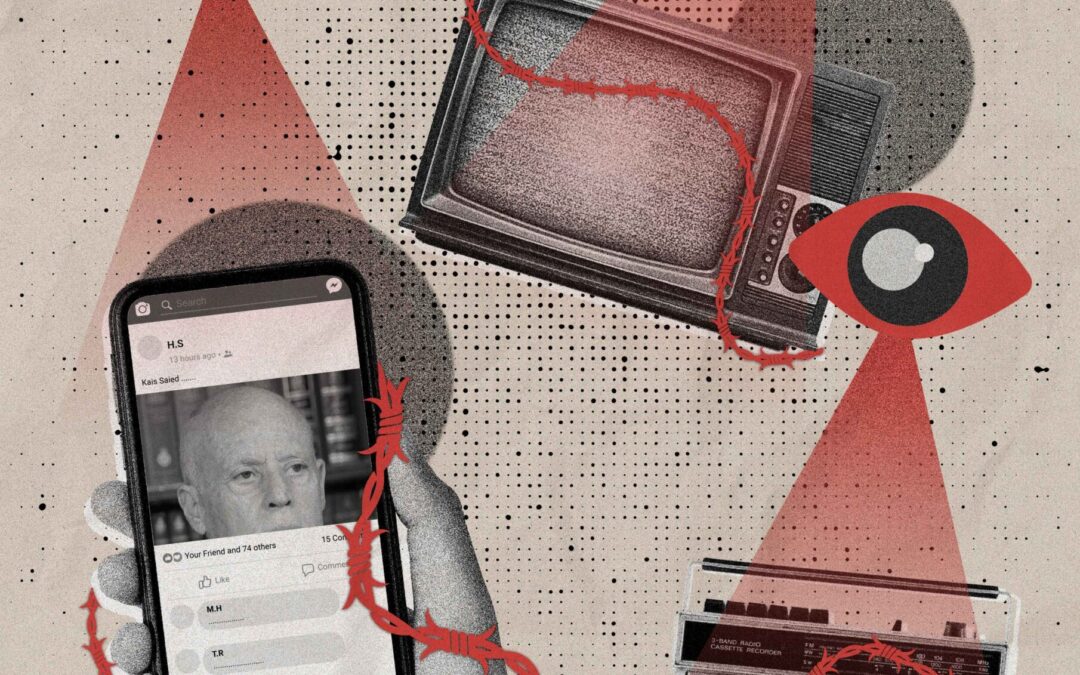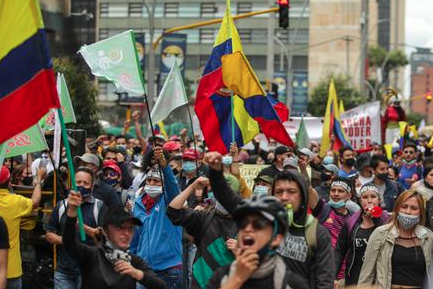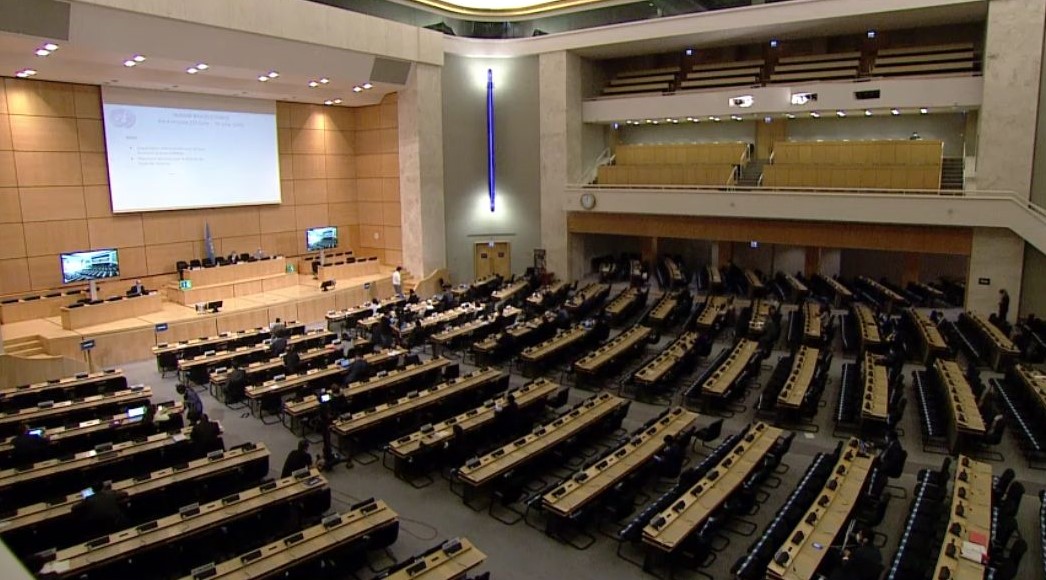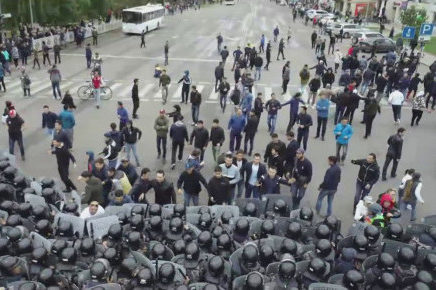
Jul 17, 2023 | Advocacy, News, Publications
The Tunisian authorities must drop all charges against anyone being prosecuted under Decree 54 for the legitimate exercise of their freedom of expression, and provide reparation for the harm suffered to the victims of such arbitrary prosecutions, the International Commission of Jurists (ICJ) said today.
البيان باللغة العربية
التقرير باللغة العربية
In a new briefing paper published today, the ICJ examines the Tunisian authorities’ enforcement of Decree 54 through which they have imposed illegal and arbitrary restrictions on the legitimate exercise of the right to freedom of expression, among other human rights.

May 7, 2021 | News
The Colombian Commission of Jurists (CCJ) and the ICJ have called upon national and local authorities to respect the right of peaceful assembly and cease all use of unlawful force against protestors immediately.
Beginning 28 April, thousands of people have taken to the streets in towns and cities throughout Colombia to protest and the social and economic policies of the current national government. As of this writing the protests continue.
The CCJ and the ICJ have expressed their concern about widespread and serious human rights violations committed during the protests.
There are multiples reports from civil society organizations that document incidents where police officials have opened fire with live ammunition against protestors.
Although full and precise figures are unavailable, as of 6 May 2021, according to the Ombudspersons’ Office at least 26 people had lost their lives. In at least 11 cases, police officials were allegedly responsible for the killings.
The NGO Temblores has documented 37 killings and the NGO Indepaz has information of more than 1.200 people injured during the protests. In addition, a number of cases of sexual violence have been reported.
The organizations are especially concerned that there are substantial number of people whose whereabouts are unknown. Complete figures on possible disappeared persons are not available. Even more worrisome, there are substantial differences among the figures provided by different sources.
In this regard, for instance, the Ombudspersons’ Office said that it has received information about the possible disappearance of 145 people. The Ombudspersons’ Office has established the whereabout of 55 people.
For its part, the civil society platform Mesa de Trabajo sobre Desaparición Forzada en Colombia has informed that it has information of 471 potential cases of enforced disappearances. According to the platform, the whereabout of 92 people have been determined.
The violent acts committed in Valle del Cauca are particularly serious. In this region, it has been reported that at least 17 people have died, and an undetermined number of people are seriously wounded.
Similarly, in Cali, some members of human rights organizations and the Office of the United Nations High Commissioner for Human Rights in Colombia alleged that they had been subject to verbal attacks and physical assault when there were verifying the situation of detained people.
The CCJ and the ICJ urge Colombian authorities to acknowledge act to address the allegations of human violations committed during the protests. They must conduct, independent, impartial, prompt, thorough, effective, and transparent investigations in accordance with Colombian law and its obligations under the International Covenant on Civil and Political Rights.
Furthermore, the investigation must take place within the ordinary criminal jurisdiction and under no circumstances should there be resort to military jurisdiction. Under international law and standards, cases that may constitute arbitrary deprivation of life or enforced disappearances cannot be considered to be connected with military duties.
Additionally, there is information that some police officials have been wounded, and at least one was allegedly unlawfully killed. The CCJ and the ICJ condemn these and other violent acts and urge judicial authorities to investigate and sanctions those responsible.
On the other hand, the CCJ and the ICJ recall that the use of force by police officials should must only be deployed in accordance with international standards. In particular, any such action must comply with the UN Basic Principles on the Use of Force and Firearms by Law Enforcement Officials.
These Principles establish that the use of force should be exceptional, necessary and proportional. Especially, authorities should faithfully comply with principle 9 that sets out that lethal force should be not used “except in self-defence or defence of others against the imminent threat of death or serious injury”.
Finally, the CCJ and the ICJ express their great concern about the national government’s decision to involve the military forces for the contention of the violence under the legal figure of “military assistance” (asistencia militar). The decision does not respect the international human rights law standards on the use of force and the right of peaceful assembly.
It should be remembered that military forces are not trained or designed to protect and control civilians during protests or scenarios of disruption of public order.
Therefore, the participation of military forces should be exceptional in situations of necessity, for example to confront immediate extreme violence and temporally limited, as affirmed by international bodies such as the UN Committee on Human rights and the Inter-American Court of Human Rights.
Contacts:
Ana María Rodríguez, Deputy Director of the Colombian Commission of Jurists, anarodriguez(a)coljuristas.org
Rocío Quintero M, Latin American Legal and Policy Adviser, International Commission of Jurists, rocio.quintero(a)icj.org

Sep 25, 2020 | Advocacy, Non-legal submissions
At the UN Human Rights Council, the ICJ and other NGOs have highlighted the joint civil society call for an international human rights monitoring mechanism on China.
The oral statement was delivered on behalf of the group of NGOs by Human Rights Watch, during the general debate on country situations. The statement builds on a joint open letter by more than 300 civil society organizations, including the ICJ, issued earlier this month.
The statement to the Human Rights Council read as follows:
“We join together to call for an international mechanism to address the Chinese government’s human rights violations, and urge the Human Rights Council to take decisive action to achieve this goal.
On 26 June 2020, an unprecedented 50 United Nations experts called for ‘decisive measures to protect fundamental freedoms in China.’ They highlighted China’s mass human rights violations in Hong Kong, Tibet, and Xinjiang, suppression of information in the context of the Covid-19 pandemic, and attacks on rights defenders, journalists, lawyers and critics of the government across the country.
Our organizations are also concerned about the impact of China’s rights violations world-wide. China has targeted human rights defenders abroad, suppressed academic freedom in countries around the world, and engaged in internet censorship and digital surveillance. We deplore China’s promotion of rights-free development and the ensuing environmental degradation at the hands of government-backed extractive industries, as well as the racist treatment of people in China, or by Chinese state actors in other parts of the world.
We are dismayed at China’s efforts to distort the mandate of the UN Human Rights Council by promoting ‘cooperation’ over accountability, and opposing initiatives to bring scrutiny of serious rights violations and international crimes in countries around the world. It has used its seat on the UN’s NGO Committee to baselessly deny accreditation to nongovernmental organizations (NGOs), while accrediting government-organized NGOs (GoNGOs). It has sought to deny access to human rights defenders to UN premises, denounced speakers on NGO side events as ‘terrorists,’ and threatened delegates to deter them from attending UN side events on rights violations, including abuses in Xinjiang.
When the UN High Commissioner for Human Rights, Special Procedures, and dozens of states urged China to comply with international human rights standards, China contended that they were ‘improper remarks’ that ‘grossly interfered’ with China’s sovereignty.
A state that tries to hold itself above any kind of scrutiny presents a fundamental threat to human rights. That China—a state with extraordinary global power—expects such treatment affects us all.
We therefore endorse the call by UN experts for a Special Session or Urgent Debate at the Human Rights Council to evaluate the range of violations by China’s government, and to establish an impartial and independent UN mechanism to closely monitor, analyze, and report annually on that topic. We urge the UN Secretary-General to appoint a Special Envoy, consistent with his Call to Action on Human Rights, and we call on the High Commissioner for Human Rights to fulfil her independent mandate to monitor and publicly report on China’s sweeping rights violations. We support the call that UN member states and UN agencies use all interactions with Chinese authorities to insist that the government comply with its international human rights obligations.
In the spirit of global solidarity and partnership, we urge the Council swiftly to counter and remediate grave human rights violations committed by Chinese authorities. No state should be above the law.”

May 1, 2020 | Advocacy
The ICJ, the International Bar Association’s Human Rights Institute (IBAHRI), and the Centre for Civil and Political Rights (CCPR Centre) today published a legal opinion by ICJ Commissioner Professor Sarah Cleveland, on compliance of Kazakhstan’s Draft Law on the Procedure for Organising and Holding Peaceful Assemblies, with the Republic of Kazakhstan’s international human rights obligations.
“Excessive restrictions on freedom of peaceful assembly in Kazakhstan have been of significant concern to the UN Human Rights Committee, the Venice Commission of the Council of Europe, and other human rights bodies for many years,” said Sarah Cleveland.
“Kazakhstan now has an important opportunity to bring its law into compliance with its international human rights obligations, but the draft law currently being considered does not achieve this.”
The Opinion finds that the proposed legislation includes of number of restrictions on freedom of assembly that are fundamentally contrary to Kazakhstan’s human rights obligations, including (1) excessive notification and approval requirements; (2) excessive authority to ban an assembly; (3) a prohibition on spontaneous assemblies; (4) restriction of assemblies to specific locations; (5) preferential treatment for assemblies organized by the government; (6) a prohibition against foreigners, refugees, stateless persons from organizing or participating in assemblies, (7) excessive obligations on organizers and participants; and (8) excessive sanctions for organizers and participants. The timing and process for adopting a law that so fundamentally impacts domestic compliance with core human rights obligations itself raises serious human rights concerns, given the limited ability of civil society organizations and the general public to participate in a robust public debate regarding the law during the quarantine.
In light of these serious human rights concerns, the IBAHRI, the ICJ and the CCPR Centre urge the Senate and/or the President of the Republic of Kazakhstan to halt consideration of the Draft Law, and to seek guidance from the OSCE/ODIHR Panel of Experts on Freedom of Assembly and Association, the Office of UN High Commissioner on Human Rights, and/or the Venice Commission regarding how the current law on freedom of peaceful assembly might be revised consistent with Kazakhstan’s international human rights obligations.
Kazakhstan-Assembly Law Opinion-Advocacy-2020-ENG (full text in PDF)









